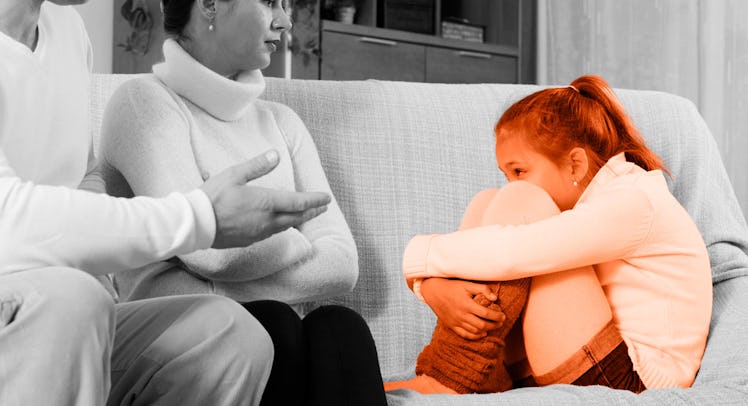How to Effectively Discipline Kids as a Parent Team
When it comes to team discipline, tagging in and out is way more supportive than good cop/bad cop.

When parents discipline side by side, playing good cop/bad cop seems pretty natural. Unfortunately, it’s a lousy idea. Sure, the contrastive approach might discourage the behaviors that parents want to discourage, but it’s frustrating for kids, who have to contend with different standards for each parent instead of consistency. It’s also frustrating for parents, who are either never taken seriously or who never get relief from clashing with the will of kids. That frustration isn’t good for anybody. A much healthier approach for parents is to enforce one standard of behavior, support reasonable discipline decisions in front of the kids, and offer relief when tempers wear thin and emotions run high.
Parents need to recognize the limits of their patience – both their own and their partner’s – and be ready to intervene appropriately, according to Dr. Roseanne Lesack, director of the child psychology clinic at Nova Southeastern University. “I think the most important piece of it is to know your own limits. Because in the heat of the moment, not only are children not thinking rationally, but adults are not thinking rationally. It’s nice when there’s someone else more rational and less emotionally invested who can say ‘okay, let me take a turn now, tag me in.’”
Being ready to intervene doesn’t mean undercutting their partner in front of the kids. Not every parent will pursue discipline in the same way or draw the exact same solutions about how to interact with their child, but if the correction is appropriate to the offense, roll with it.
“Assuming that the punishment is logical and proportional, even if it isn’t the way you would go about doing it, usually I recommend allowing that parent to finish what they started unless you can offer some help,” says Lesack. “Then talk about it afterward if you would’ve done something differently, about how to approach it.”
Sometimes discipline becomes proportional to the parent’s frustration instead of the offense, and it’s okay for a parent to quickly speak in private and help determine if the punishment threatens to be too unwieldy to enforce, but in general, parents should wait to talk about the situation privately afterwards, when everyone has calmed down. Talking about it isn’t necessarily a reproach, either; it’s a function of supportive parenting.
“That’s going back to what does a logical consequence look like in your house – what is an appropriate response when a child hits? What is an appropriate response when a child tantrums?” says Lesack. “That’s when you’ll want to be that united front, so discussing it afterward is to make sure when it happens next time you’ll both address it in a similar manner. But going through it at that moment, I try to make sure I am supporting my partner and not undercutting them unless there are some really bad things going on.”
How to Discipline as a Couple
- Consistent standards – parents need to both enforce the same rules, and should talk about what the rules and consequences are.
- Support one another – disagreements about discipline are going to happen, but they shouldn’t happen in front of children. Discuss them in private.
- Tag in and tag out – when things start to get emotional (and they will) it’s okay to step away and trust the other parent will handle it.
Parents may regret discipline that they later recognize is disproportionate, and if the child is appropriately mature, it’s okay to revisit the situation after things have calmed down. Describing how a discussion went wrong is an important step to preventing repeats. And apologizing when appropriate helps teach kids how to manage their own relationships when things get tense.
“I think that’s also an important lesson to teach your children – if you make a mistake, own your mistake and go back and fix it,” says Lesack. “That’s exactly what we want our children to be able to do also – to reflect back and ask if they handled a situation the best way, and if the answer is no, how to fix the situation.”
This article was originally published on